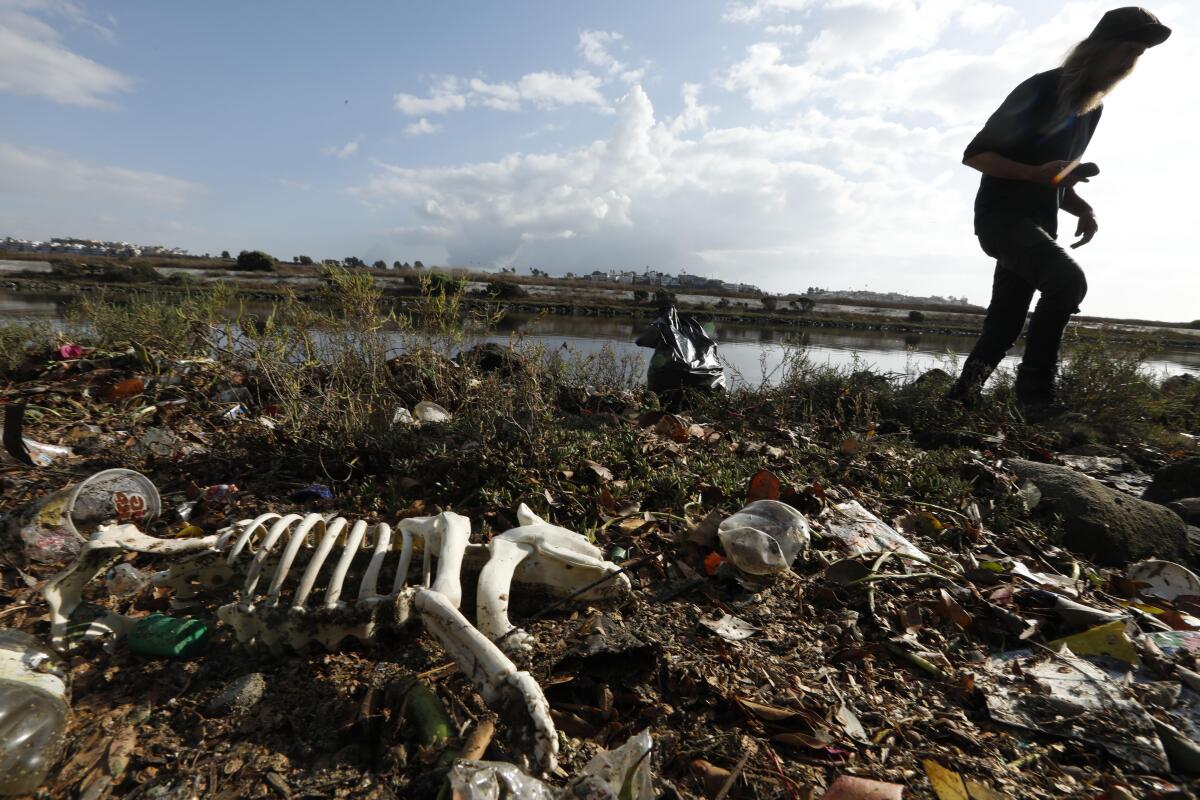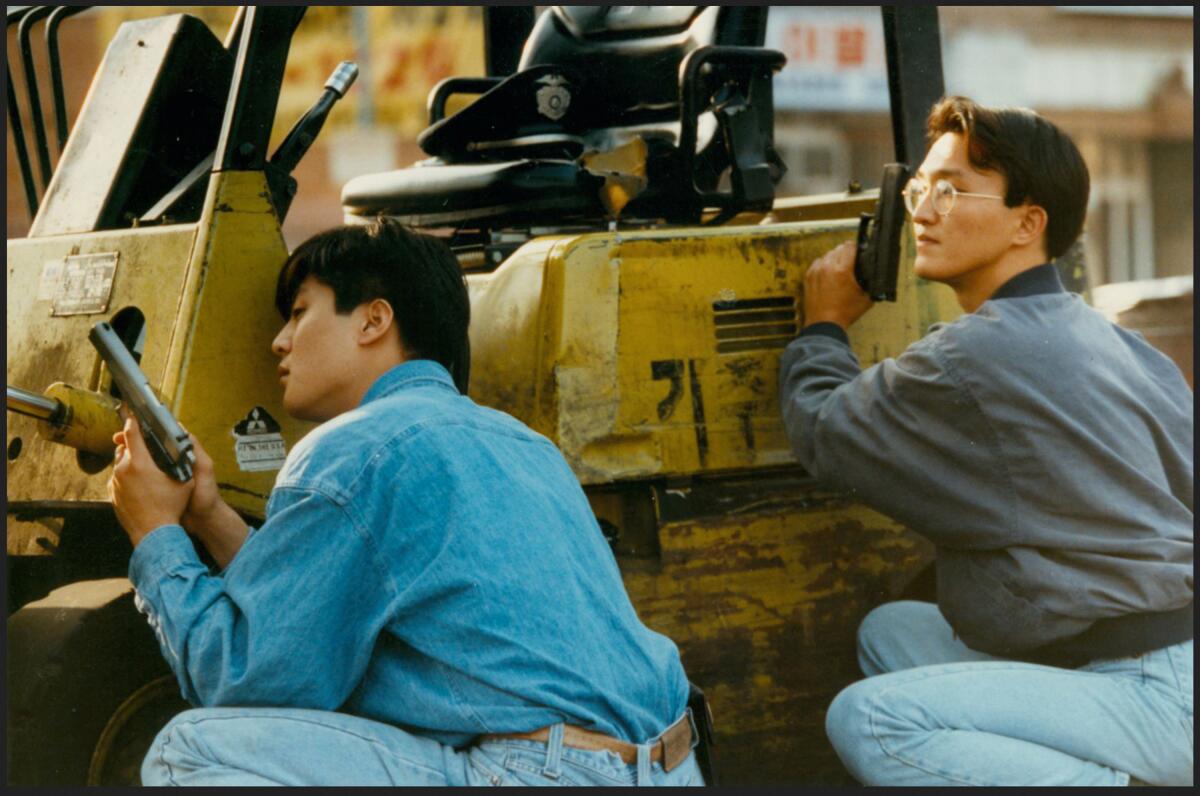Today’s Headlines: California blames Exxon Mobil for the plastics crisis

- Share via
By Amy Hubbard
Hello, it’s Friday, April 29, the 30th anniversary of the L.A. riots. We have a great package of coverage on that seminal event, its scars and changes it wrought. But for the newsletter, I wanted to talk to some of the people who were in The Times newsroom in 1992 about what they saw and felt.

Photojournalist Kirk McKoy spoke of the tumult early the first day, when he was rushing to a protest along with then-Washington Post photographer Dayna Smith: “As we raced down Florence, heading toward Normandie, traffic became gridlocked.” Kirk and Dayna left the car they were in and started jogging. “As we progressed closer to the now-famous intersection, a crowd of people was running” in the opposite direction. They warned the photographers: “‘Don’t go down there.’ One of the girls looked at Dayna and said to her, ‘Especially you! Don’t go down there!’ ... [But] she stayed on my heels. Until she wasn’t!” Kirk looked back to see Dayna lying on the pavement. “She was hit in the head by a rock and bleeding.” (She received help.)
Kirk earned a Pulitzer Prize for his work during the riots. See his and other photographers’ iconic riot photos, overlaid on current footage of L.A. sites, here. And scroll down to From the Archives for more memories.
Now here are other stories you shouldn’t miss today.
TOP STORIES
California accused Exxon Mobil of perpetuating a recycling ‘myth’
State Atty. Gen. Rob Bonta announced a first-of-its kind investigation into the fossil fuel and petrochemical industries for their alleged role in causing and exacerbating a global crisis in plastic waste pollution. Fossil fuels such as oil and gas are the raw material of most plastics. In recent decades, the accumulation of plastic waste has overwhelmed waterways and oceans, sickening marine life and threatening human health.
Bonta said his office had subpoenaed Exxon Mobil Corp., seeking information related to the company’s role in global plastics pollution: “For more than half a century,” he said, “the plastics industry has engaged in an aggressive campaign to deceive the public, perpetuating a myth that recycling can solve the plastics crisis.”
In a statement, Exxon Mobil denied the accusations. “We are focused on solutions,” a spokesperson said, “and meritless allegations like these distract from the important collaborative work that is underway to enhance waste management and improve circularity.”
Start your day right
Sign up for Essential California for the L.A. Times biggest news, features and recommendations in your inbox six days a week.
You may occasionally receive promotional content from the Los Angeles Times.
As Russia bombarded Kyiv, Biden said he’d seek $33 billion in aid for Ukraine
Ending days of relative calm in the Ukrainian capital, Russia bombarded Kyiv — even as the head of the United Nations visited and met with President Volodymyr Zelensky — while ramping up attacks along the besieged country’s eastern front, Ukrainian officials said.
The attacks came as President Biden announced he was seeking $33 billion in additional military and humanitarian aid for Ukraine and sought congressional approval to seize the assets of Russian oligarchs who support Russian President Vladimir Putin and use the funds to help Ukraine.
U.N. Secretary-General António Guterres, uninjured amid the violence, inspected the sites of suspected atrocities committed by Russian forces and denounced the “evil” of the Kremlin-ordered invasion: “The war is an absurdity in the 21st century.”
More on the war in Ukraine
- Poland has taken in more Ukrainian refugees than all other countries combined. In Warsaw, where 300,000 arrived, a city’s life has been transformed.
South L.A. was promised a resurrection after 1992. It never came.
The uprising that roiled Los Angeles put a spotlight on the socioeconomic injustice that bogs South L.A., bringing pledges of investment and community development. Thirty years later, many families don’t have access to better jobs, grocery stores are still a rarity, and the investment that’s coming in is — primarily — making housing unaffordable.
“People are still living on minimum wage,” said one business owner. “There’s just no way to succeed in this area.”
More on the anniversary of the riots
- Thirty years later, everyone who experienced Saigu (4/29) in Koreatown is scarred in some way, whether it is the unending grief of Jung Hui Lee, whose son was the only Korean American killed in the riots, or the questions still asked by a man who as a teenager saw the stores of fellow church members burned down.
A legal filing revealed the first eyewitness account of Sheriff Alex Villanueva allegedly lying about a cover-up
Former Assistant Sheriff Robin Limon, once one of Villanueva’s closest advisors, filed the legal claim. In it she said she personally brought a DVD containing a video of a deputy kneeling on a handcuffed inmate’s neck to Villanueva — and watched it with him and two others five days after the incident happened. The L.A. County sheriff has claimed he learned of the March 2021 incident eight months after it happened and took swift action.
The filing also included allegations about retaliation and other improprieties in the Sheriff’s Department.
After The Times last month reported on the cover-up, Limon’s claim said, Villanueva demanded that she retire or she would be demoted four ranks — from assistant sheriff to lieutenant.
Our daily news podcast
If you’re a fan of this newsletter, you’ll love our daily podcast “The Times,” hosted every weekday by columnist Gustavo Arellano, along with reporters from across our newsroom. Go beyond the headlines. Download and listen on our App, subscribe on Apple Podcasts and follow on Spotify.
CALIFORNIA
The LAUSD failed students with disabilities during the pandemic, a federal investigation found. Los Angeles Unified did not provide appropriate education to the students as required under federal law and must provide extra services to help some of the most vulnerable recover from the significant voids in their learning, the U.S. Department of Education announced.
Rick Caruso has spent $23 million on his bid to become L.A. mayor. The sum will probably dwarf the combined spending of the other candidates in the field. That influx of cash — which has largely come out of the billionaire real estate developer’s own pocket — has reshaped the race to succeed Mayor Eric Garcetti. By comparison, Rep. Karen Bass has spent nearly $800,000 this year.
L.A. coronavirus cases are up 40% in one week; hospitalizations are creeping up too. Although neither the number of infections nor the patient census are setting off alarm bells just yet, the trend lines illustrate that the county is contending with reinvigorated coronavirus transmission. Meanwhile LAUSD Supt. Alberto M. Carvalho said that, after consulting with experts, he would ask the district’s board to hold off on enforcing the student vaccination mandate until July 1, 2023, at the earliest.
Support our journalism
Subscribe to the Los Angeles Times.
NATION-WORLD
Climate change will result in thousands of new viruses spreading among animal species by 2070. That’s likely to increase the risk of emerging infectious diseases jumping from animals to humans, according to a new study.
The FDA released a plan to ban menthol cigarettes and flavored cigars. The agency said eliminating menthol cigarettes could prevent 300,000 to 650,000 smoking deaths over 40 years. “The proposed rules would help prevent children from becoming the next generation of smokers and help adult smokers quit,” said Health and Human Services Secretary Xavier Becerra.
President Biden said he was considering some student debt relief — but not $50,000. The president shot down speculation on the figure after Democratic lawmakers in favor of forgiveness suggested he was moving in their direction. Still, he said he was “in the process of taking a hard look at whether or not there will be additional debt forgiveness.”
Dog personality stereotypes are untrue, a new study says. The American Kennel Club website describes the ideal form and temperament of 204 dog breeds, from the affenpinscher (“loyal, curious and famously amusing”) to the Yorkshire terrier (“feisty, brave and sometimes bossy”). The idea that certain breeds reliably exhibit distinct behaviors is widespread. Yet a detailed new study of dog behavior and genetics suggests that breed is actually of little value in anticipating the behavior or demeanor of any individual animal.
HOLLYWOOD AND THE ARTS
Apple’s ‘Shining Girls’ wouldn’t be half as good without the great Elisabeth Moss. In the series premiering Friday, Moss plays a Chicago newspaper archivist who, having survived a brutal attack six years earlier, is brought out of her cocoon when the body of another woman is discovered with similar wounds. Making choices that are never pat, Moss elevates an adaptation of Lauren Beukes’ novel about a serial killer and his survivor.
How Miranda Lambert became country’s queen without ever kissing the ring. In a conservative and male-dominated genre, Lambert defied odds, and the Nashville establishment, by achieving stardom on her own terms.
A mesmerizing ‘Hadestown’ at the Ahmanson makes an old tale feel startlingly new. Anaïs Mitchell’s Tony- and Grammy-winning musical reimagining the myth of Orpheus and Eurydice, has arrived in Los Angeles with a cast that includes Tony winner Levi Kreis as Hermes. The show travels to the underworld and back again with liquified grace, writes theater critic Charles McNulty.
Ahead of a new documentary about racial inequities in healthcare, Oprah Winfrey opens up to The Times about her own experiences. Winfrey is the executive producer of “The Color of Care,” in which families of color who lost loved ones to COVID-19 tell of the harrowing experiences their family members faced trying to access care before they died. Winfrey said she was appalled at the lack of acknowledgment of lives lost to the pandemic: “I am stunned. I don’t recognize a country where you’ve lost nearly a million people and there hasn’t been some form of remembering that is significant.”
BUSINESS
Netflix began a round of cost-cutting. The streaming service eliminated an undisclosed number of marketing-related jobs a week after it reported its first subscriber loss in more than a decade. Netflix lost 200,000 subscribers in the first quarter and expects to lose even more in the current quarter, a disclosure that rattled investors and highlighted the mounting competitive pressure Netflix faces.
Ex-Disney CEO Michael Eisner is shopping around his compound for $225 million. That would make it the most expensive home sale in California history. The five-acre spread on the bluffs of Malibu include nine structures, as well as a cliff-side elevator that descends to the beach.
Snap has introduced Pixy. The new drone costs $230, weighs about a quarter of a pound and hovers around you to film you automatically.
OPINION
Under Elon Musk’s Twitter takeover, who will protect users? Technology companies are media companies. They have a responsibility for the way they affect our lives and democracy. Just as we need rules for television and the telecommunications industry designed to protect people, we need rules for technology companies.
Xi Jinping says democracy is failing, and he’s not entirely wrong. The strongest evidence of democracy’s weakness has got to be the tepid U.S. response to climate change over the last 25 years. Why have we failed to rise to the occasion? One: Our system allows the oil and gas industry to wield grossly disproportionate power — thanks to the way money distorts our politics. Two: In a democracy, elected officials have no incentive to support policies that require pain and sacrifice today in exchange for future gain.
Free online games
Get our free daily crossword puzzle, sudoku, word search and arcade games in our new game center at latimes.com/games.
SPORTS
The Chargers made a surprise selection in the first round of the NFL draft, choosing Zion Johnson. The guard from Boston College will help the team efforts to rebuild the offensive line. They are looking to upgrade the right side of their line and Johnson gives them options.
Shohei Ohtani believes Mike Trout has already reclaimed his unofficial title as the best player in baseball. He rejected the idea that he and Trout could push each other to greater heights, intimating he was unworthy of exercising such influence over the three-time MVP. “I feel like I’m being pulled along by him,” Ohtani said. The opportunity to bestow such praise on a teammate represented a marked change for Ohtani and the team that employs him, writes columnist Dylan Hernández. Offensively, the Angels are the team they were expected to be the last two seasons.
Can Jerry West take his case against HBO to the Supreme Court? Or any court? The basketball legend is furious about “Winning Time,” a cable series about the Lakers’ Showtime era that portrays him — in the words of his attorney — “as an out-of-control, intoxicated rage-aholic.” Legal experts say the letter that West’s lawyer delivered to the network lays the groundwork for a difficult but nonetheless viable lawsuit.
WHAT OUR EDITORS ARE READING
Note: Some of the sites we link to may limit the number of stories you can access without subscribing.
An essay on the value of human excrement. The Western world needs to get over its queasiness about human excrement, says the author, who grew up in rural Russia, where there was an earthy appreciation of feces as fertilizer. New York inhabitants alone produce about 8 million pounds of excrement a day. Just imagine how much is produced daily by the planet’s 7 billion people. What do we do with all this poo? Sewage plants get rid of dangerous pathogens, but potent fertilizers flow into nearby waters, overfeeding lakes, rivers, the ocean. “By taking our poo out of the equation, we altered not only our agriculture, but the entire planet’s ecology.” Aeon
What living a sustainable life looks like. In 2003, the town of Kamikatsu, Japan, announced it would become zero-waste. Since then, the town of about 1,500 has swapped open-air burning of its waste for “a system of buying, consuming and discarding with the goal of reaching carbon neutrality.” They say they’re about 80% of the way there. Among the ways they’re accomplishing their goal: Residents clean and dry dirty items for recycling and then, at a town facility, sort them into 45 categories. A brewery makes craft beer from farm crops too misshapen to be sold publicly. A cafe reduces food waste by offering one dish for lunch, and it’s made from local vegetables. Washington Post
An ode to gummy candy. Haribo created its bears in Bonn, Germany, a century ago, and now gummies can be found all over the place — in sour versions and soft versions, covered with chamoy and chile as dulces enchilados, as supplements in the wellness industry, even as delivery systems for booze and THC. The first gummies — chewy and gelatin-based — were modeled after real-life dancing bears (popular at the time). It wasn’t until the 1980s that the U.S. embraced the candy, with the worms of Trolli and Modelez’s Sour Patch Kids. If you dare, check out the TikTok celebration of gummy candy on Candytok. New York Times
YOUR WEEKEND

Eat a tlayuda. Restaurant critic Bill Addison says Poncho’s Tlayudas is one of the places he takes people to say, “This is the Los Angeles I love.” At the weekend Oaxacan pop-up in South L.A., Alfonso “Poncho” Martinez grills his 14-inch specialty over live mesquite coals. “Martinez’s masterwork coaxes all the senses into play. You pick up a hot, fin-shaped section of tlayuda with fingers dancing to keep from burning. The tortilla smells of corn warmed by sunshine. Your eyes gauge the best starting point to dive in; it’s at the crease, where you’ll find a density of tastes and textures. A two-toned crackle-crunch rings in your jaw; your taste buds register layered spice and earthy depths from the beans and threads of half-melted cheese. You’re aware of your serene surroundings in a shrubbery-filled yard, in a grove of tables filled with diners in similar states of elation. But you’re also very focused on the tactile marvel that is yours alone to savor.”
Take the 7 Park Challenge. Escapes author Rachel Schnalzer looked at national park trips that Angelenos should be able to squeeze into a weekend. Included are the most-visited park in California — Yosemite — and the least-visited: Channel Islands. Read about the challenge here. Bonus: Wild author Mary Forgione says Channel Islands fans will have a new place to stay this summer as a new campground is being built near Prisoners Harbor on the east side of Santa Cruz Island.
FROM THE ARCHIVES

More Times staff memories from the L.A. riots:
Thirty years ago today, when the 1992 riots occurred, writer Maria La Ganga was an assistant editor in Business, working in The Times’ downtown L.A. building and living in the Fox Hills neighborhood of Culver City. She recalled driving home late at night: “Heading west on the 10, the city was quiet and dark, lit by fires from burning buildings. The National Guard was stationed at the Fox Hills Mall, soldiers in uniform with guns where I sometimes shopped. It felt like the city was at war. With itself.”
Columnist Sandy Banks: “It is not the horror of the riots but the heartbreak of the verdicts that I remember most — the physical pain, like a blow to the chest. I recall the ashen faces of my white colleagues as we listened in the newsroom. They, too, were rendered suddenly speechless, stunned and bewildered by the acquittal of officers we had all seen viciously beating Rodney King. As crowds began to gather outside our office and the rock throwing began, I gathered my things, stifled my sobs and walked out of the newsroom. My heart was with the rioters. I needed to go home.”
Editor Mary Ann Meek: “My memories of the riots come primarily as snapshots: the moment a brick hit the third-floor window of The Times building, where I stood watching protesters move south from Parker Center; what the fires burning across the city looked like from the 10/405 interchange as I drove home that first night; the sight of National Guardsmen with automatic weapons patrolling the oddly quiet streets downtown in the nights to come — all of the scenes unnerving, seemingly unreal.”
Writer Greg Braxton: “One of the memories that still haunts me when I think back on the uprising is linked to driving through the community where I grew up and seeing familiar businesses being looted and vandalized. It was truly surreal. At one point I happened by a market where a crowd was looting. I thought of going in and doing some reporting on the scene, but did not. I was afraid of possibly getting arrested, but I also know that I did not really want to confront the harsh reality of what was happening to my beloved city. It disturbs me to this day.” (A great essay here from Greg on racism in the newsroom.)
We appreciate that you took the time to read Today’s Headlines! Comments or ideas? Feel free to drop us a note at [email protected].
Sign up for Essential California
The most important California stories and recommendations in your inbox every morning.
You may occasionally receive promotional content from the Los Angeles Times.




